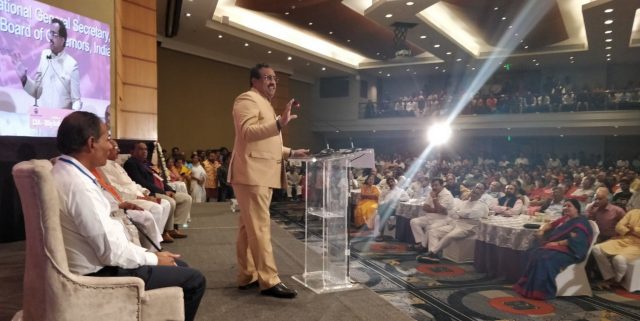
CAA doesn’t apply to any Indian citizens, and doesn’t discriminate on the basis of religion, it only offers citizenship to persecuted minorities of neighbouring countries of Pakistan, Afghanistan and Bangladesh, if they fulfil certain criteria, and doesn’t automatically grant citizenship to all refugees. Citizenship is usually by birth, registration and naturalization; only the category of ‘persecuted minorities’ has been added as a provision to the old Act, said Sri Ram Madhav, General secretary, BJP and Member of India Foundation.
Sri Ram Madhav was speaking at a public talk ‘CAA -Why India needs it?’ mutually organized by Pragna Bharati and Social Cause at Hotel Marriott, Hyderabad on the evening of 3rd January 2020.
The 90% of Indians support CAA and if numbers are the basis, it indicates India completely supports CAA. Yet govt is making efforts so that even the 10% of our people who are being misled and provoked by opposition parties, especially Congress party and communists, would understand the provisions of this simple and positive law, he added
Unfortunately, the Congress party doesn’t read it’s own history, statement of its own leaders, and seem to be ‘knowledge-proof’. PM has repeatedly assured that Indian citizens need not worry. CAA is completely non- discriminatory and is not against any provisions of constitution. The Modi govt is totally committed to letter and spirit of the Constitution, he added.
Recalling historical events of post partition, Sri Ram Madhav said Indian nation was partitioned on the basis of religion, it’s recorded that more than 1.5 crores population got displaced in the exodus that followed partition. Nehru- Liaqat Pact of 1950 attempts to stem the migration, both countries were required to protect minorities in their respective countries. However, Pakistan after declaring itself as ‘Islamic republic’ flouted the pact then systematically persecuted Hindus and Sikhs, which reflects in drastic reduction of minority population in Pakistan and Bangladesh.
CAA is a correction of this historic anomaly and offers protection and status to those persecuted minorities who reached India before 31st December 2014. Even Indira Gandhi -Mujibur Rahman agreement gives citizenship to over 12 lakhs refugees who reached India after being terrorised by Pakistani army. India is only discharging it’s civilizational, historical and moral duty of sheltering and protecting refugees, like it has done in the case of Jews and Parsees too in past.
All other laws pertaining to granting citizenship are functional, and anyone who desires to be Indian citizenship can apply through those laws. Sonia Gandhi and singer Adnan Sami were among hundreds of others have been given Indian citizenship.
Sri Ram Madhav has assured that govt of India is fully sensitive to Assam’s genuine concerns, as the state has borne migrants for an additional 20 years till 1971, and assures Assam that Assam’s own culture, language and indigenous populations ethnicity will be safeguarded and protected. Clause 6 of Assam Accord 1985 is being activated now.
Sri T. Hanuman Chowdary, chairman Pragna Bharati in his opening remarks said that even though CAA doesn’t concern Indians, the ‘Breaking India’ forces are active in dividing the country. Indian political parties have a moral responsibility towards unfortunate persecuted minorities of Pakistan, Bangladesh and Afghanistan, whose population reduced drastically since partition, to give shelter and citizenship. Yet when BJP govt has taken a long- pending step, other political parties are not supporting it.
He added that the illegal infiltrators from Bangladesh and Rohingyas are being systematically absorbed into Indian society by many states like Bengal and Kerala. Some parties are congenitally anti-Hindu and they are in the forefront of protesting a positive law like CAA.
The public meeting was attended by overwhelming number of audience representing various walks of society.














